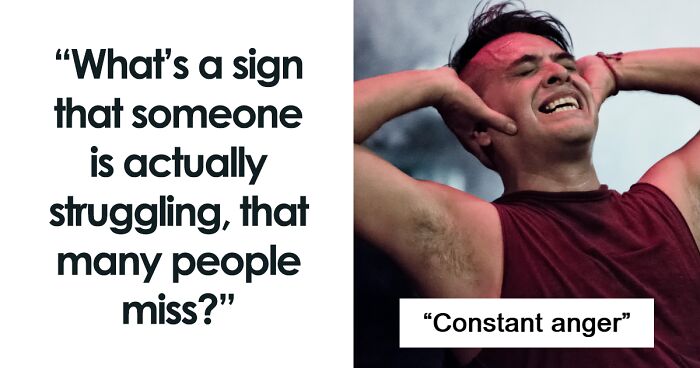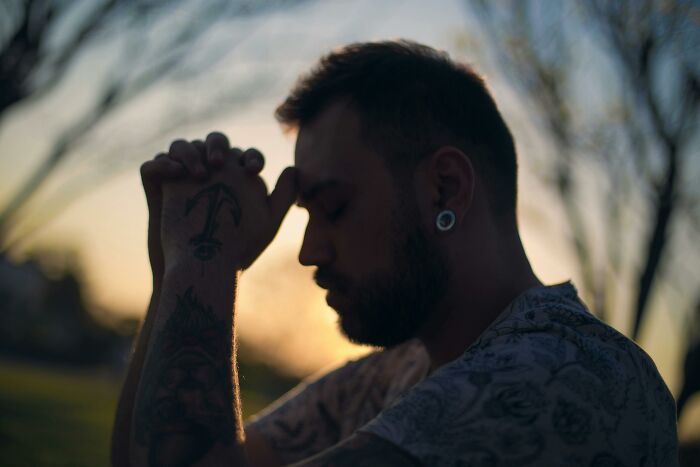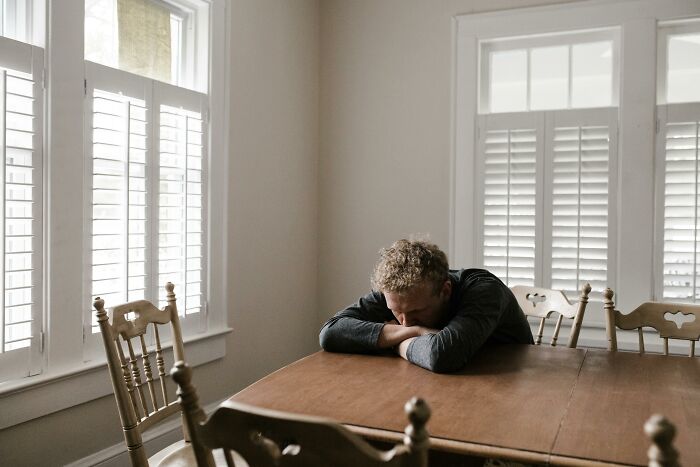
“You Don’t Realize That Until It’s Too Late”: 30 Signs That Somebody Is Not Okay
Interview With ExpertReaching out for help is hard. It can be difficult to even admit to yourself that you’re struggling, let alone be honest with another person about what you’re going through. But the reality is that half of us will experience a mental health disorder at some point in our lives, and there’s absolutely no need to suffer in silence.
To make sure we’re looking out for one another, Redditors have recently been sharing subtle signs of mental health struggles that often go unnoticed. Below, you’ll find some eye-opening replies that might remind you to check in with your loved ones, as well as conversations with Lau Ciocan, Founder of Mentoring Advocacy Network, and registered psychotherapist and life coach Krista Roesler from Psych Company!
This post may include affiliate links.
 As Robin Williams once said:
As Robin Williams once said:
I think the saddest people always try their hardest to make people happy because they know what it’s like to feel absolutely worthless and they don’t want anyone else to feel like that.
To gain more insight into this topic, Bored Panda got in touch with Lau Ciocan. Lau is a TEDx speaker and the Founder of Mentoring Advocacy Network (MAN), a platform raising awareness on men's mental health and healthy masculinities through public speaking, webinars, and The Mentality Podcast. He was nominated for the Future Leader Award, and MAN was shortlisted for the Best Men's Health Initiative by the InsideOut Awards in 2023 and 2024.
When it comes to the common signs of mental health struggles to look out for, Lau says, "It's important to bear in mind that the signs of mental health challenges might differ from person to person and we might miss them in some people who 'camouflage' or 'mask' their struggles well."
 During my worst depressive relapses, I would constantly ask how people were doing. If someone you know is constantly asking everyone how they’re doing/if they’re okay with little to no reason to why they ask, please ask it back. I was on the verge of s*icide many times in the past and all I could ever do was reach out, ask if someone was okay, and that I love them. I was never asked it back. It’s a miracle that I’m still here.
During my worst depressive relapses, I would constantly ask how people were doing. If someone you know is constantly asking everyone how they’re doing/if they’re okay with little to no reason to why they ask, please ask it back. I was on the verge of s*icide many times in the past and all I could ever do was reach out, ask if someone was okay, and that I love them. I was never asked it back. It’s a miracle that I’m still here.
"The signs that might fall under the radar and need a closer look could be someone experiencing hyper-productivity, irregular sleep patterns or eating habits. However, some of the more evident signs of struggle include the overall change in behavior and personality, gradual and progressive distance from loved ones, increased levels of fatigue, or lack of motivation and enthusiasm," the expert added.
 When someone has struggled and things suddenly seem better overnight, despite there being no known reason for the change.
When someone has struggled and things suddenly seem better overnight, despite there being no known reason for the change.
So you stop worrying about them. They’re better now.
You don’t realize that it’s because they made a plan.
You don’t realize that until it’s too late.
As for what we should do when we notice these behaviors, Lau says it depends on the relationship one has with the person experiencing mental health challenges. "We don't know what this person is going through, so the first step one can take is to approach the situation with compassion and sensitivity and ask open questions that allow the person to open up," he shared. "And if they do, one should listen attentively and without judgment."
"I would also say that one should assess for risk of suicide or harm, and if serious contact the relevant professional services," the mental health expert added. "In parallel, one should encourage the person to get the appropriate professional help and offer assistance and support in doing so."
 They don't have the same excitement about things they used to really enjoy.
They don't have the same excitement about things they used to really enjoy.
But it's important to address these concerns, because Lau says noticing the signs early on can ultimately save someone’s life. "Reaching out and offering support may prevent further struggle and increased risk of harm or even suicide," he noted. "At times, your loved one may be unaware of the impact of their poor mental health, on themselves or you. Constructively sharing your concerns may enlighten them and encourage them to seek the appropriate help."
Look for the guy that is constantly doing things for other people. This guy is super nice. He goes out of his way to make others happy. He is a good listener. He gives really good advice. He picks others up when they are down.
And that guy…… that guy right there…… is really….. really….. struggling.
"Anyone can be affected by poor mental health; we all have bad days. However, creating healthy lifestyle patterns can contribute to maintaining a positive mindset," Lau added. "Some good tips to do this include: setting time aside for self-care, like going for a walk in a park or nature, journaling or spending time on a hobby; sleeping for at least 7 hours a night; eating well, and drinking plenty of water; exercising regularly, whether it’s going to the gym or a 20-minute walk; prioritizing a balance between work and life; and always share your feelings with those you trust."
 Messy/dirty house. Not all people with messy houses are mentally ill, but if the state of a friend’s house is continuously deteriorating and /or simple tasks (like throwing away cans) are left undone, it’s a big sign. Sometimes someone who is struggling will clean the fridge and wash clothes but be unable to throw away mail, or pick up trash. It’s hard to explain.
Messy/dirty house. Not all people with messy houses are mentally ill, but if the state of a friend’s house is continuously deteriorating and /or simple tasks (like throwing away cans) are left undone, it’s a big sign. Sometimes someone who is struggling will clean the fridge and wash clothes but be unable to throw away mail, or pick up trash. It’s hard to explain.
When I was struggling with depression normal cleaning did get really hard but I could occasionally struggle through it, but what was pretty much impossible was paying bills. Not because I didn't have money, it was just this weird mental block. I pay my bills online at home and it isn't a difficult process but I still couldn't do it.
 Somebody who's always tired. Especially for high functioning depressives, their home and workspace can be neat and tidy, their bills are paid on time and they are cordial when socializing. But they will always say they are tired. Depression exhaustion runs deep.
Somebody who's always tired. Especially for high functioning depressives, their home and workspace can be neat and tidy, their bills are paid on time and they are cordial when socializing. But they will always say they are tired. Depression exhaustion runs deep.
I'm tired all the time. Waking up every single morning seems like a daily punishment... It is so tiring
We were also lucky enough to get in touch with registered psychotherapist and life coach Krista Roesler from Psych Company, who discussed this topic with Bored Panda as well.
"Common signs of mental health struggles that people might not be aware of or know to look for include changes in behavior, personality, or emotional expression," the expert shared. "For instance, someone who used to openly share their feelings might become more quiet and distant, while someone who was previously very excitable may become unusually calm. Similarly, a person who was kind and caring might start acting unkind, and someone who seemed sad might appear outwardly content."
 Someone who is always stressed out, on edge, and irritable is suddently calm, nonchalant, and doesn't care about c**p anymore.
Someone who is always stressed out, on edge, and irritable is suddently calm, nonchalant, and doesn't care about c**p anymore.
Check on this person. Maybe they got a girlfriend/boyfriend or a big promotion or finished a huge project. But also - maybe they've given up and have an *exit plan* in place now.
"Other signs include emotional distancing from people and activities they once enjoyed, leading to increased isolation from others and a loss of interest in hobbies or work," Krista continued. "They might also experience physical symptoms such as headaches, body aches, or upset stomachs."
"Changes in sleeping patterns are another important indicator. Look for signs such as sleeping too much, too little, experiencing insomnia, or persistent fatigue," the expert says. "Additionally, certain risk factors can signal underlying issues, including financial problems, legal troubles, trauma, chronic pain, health issues, relationship problems, or substance abuse."
 I struggle with major depression. I can answer this for myself, but as always, this won’t appear in everyone.
I struggle with major depression. I can answer this for myself, but as always, this won’t appear in everyone.
1. I use humor a lot. Like every conversation. It’s a quick shot of dopamine to make people laugh and it avoids talking about myself. Kills two birds with one stone. My therapist said one time after not seeing him for six months “I see you are still using humor as a way to not feel your emotions.” Haha. F**k you.
2. I am purposely vague on what I’ve been doing. Like “oh I’ve been working and hanging with the kids.” Or “nothing much just the same old s**t.” This can be easily interpreted as “I’ve been holed up in my room not showering, maybe crying, convincing myself that everyone hates me.”
3. Random outbursts of negativity. Sometimes veiled as jokes. I recently blurted out to my sister while driving “nobody has any empathy anymore!” At a driver. It made people laugh.
3. I constantly make excuses on why I can’t go somewhere. It’s usually because I’m tired, or busy with the kids, but in reality I’m avoiding having to give an update on my (distorted view) s****y little life while everyone talks how amazing everything is.
There are others but these were the first I could think of.
Edit: If anyone feels the same as this feel free to send me a message. I’ve learned that getting through it with someone can be extremely helpful. (Males preferably. I need more guy friends.).
The edit is cute. How do you and others here even maintain a relationship to have a family though (serious question)? I can't even maintain a daily friendship. Work is extremely difficult seeing the same faces everyday and being "on" and pretending to give even the slightest of f***s because in my world, none of this matters and am just visiting this planet. Honestly, if it weren't for my dog, wouldn't even bother. Ever. Seriously look at people all the time and wonder "how" because basic human interaction eludes me. I wish i knew how to human. And yes my space is always a mess but i try really hard not to be. Non mess makes me feel weird.
 Common disassociation, just seeing someone disconnect from reality white sitting at a bench or in a friend group just breaks my heart.
Common disassociation, just seeing someone disconnect from reality white sitting at a bench or in a friend group just breaks my heart.
And we often don't know we've disconnected. 😞 It wasn't until my mid-30's that I noticed that chunks of time were missing and I'd been staring at the same spot on the floor for who knows how long.
Krista noted that some other concerning signs to be aware of are: "expressing feelings of guilt, shame, or hopelessness; neglecting personal hygiene and abandoning healthy habits, such as a balanced diet and regular exercise; being less attentive to medication schedules and failing to manage chronic health conditions, like diabetes; showing indifference toward declining performance at work or school; increasingly avoiding social situations without a clear reason; heightened use of alcohol or worsening drug abuse; engaging in reckless behaviors, such as unsafe driving; and making unusual purchases, like items that could be used for self-harm, which aren’t typically needed."
Having trouble getting out of bed, having low energy. Many people are quick to call it lazy but really we are struggling to have any energy to just wake up and exist in a world where life hasn't been kind.
Whenever you ask them how they're doing, the answer is *always* 'ok' or 'I'm fine, just a bit tired."
Everyone has sh**tier days. Everyone will rant once in a while. But not when depressed.
You don't want to be even more of a burden than you feel you already are. You don't want to admit to yourself or to others or to both that you are actually struggling with everyday things. You don't want to always be complaining. You don't want to look like a failure. You don't believe the question is asked in earnest; why should anyone care anyway? Or you simply feel nothing, but that's not exactly an acceptable answer now, is it.
So 'ok' it is.
We also asked Krista what we should do if we notice any of these concerning behaviors in loved ones. "If you're concerned someone might be suicidal, start by expressing your worry gently and directly, such as saying, 'I’ve noticed you’ve been struggling a lot lately, and I’m really worried about you,'" she told Bored Panda. "Create a safe space for them to share their feelings without judgment, and encourage them to seek help from a mental health professional."
 At least in men, social withdrawal is often the first and largest symptom of depression. We can put up a really good facade, but if you notice one of the boys not showing up to social functions as much, and no one is hearing from him, check in on him for f***s sake.
At least in men, social withdrawal is often the first and largest symptom of depression. We can put up a really good facade, but if you notice one of the boys not showing up to social functions as much, and no one is hearing from him, check in on him for f***s sake.
 Everything takes forever. I take hours to reply to texts, hours to get out of bed, hours to go to the store.
Everything takes forever. I take hours to reply to texts, hours to get out of bed, hours to go to the store.
 Hygiene is a huge one, noticing they only ever have their hair up, or rumpled clothing, if they normally wear makeup and suddenly stop for no reason. People normally notice when it gets to not showering but it can be in small ways.
Hygiene is a huge one, noticing they only ever have their hair up, or rumpled clothing, if they normally wear makeup and suddenly stop for no reason. People normally notice when it gets to not showering but it can be in small ways.
"If necessary, ask directly if they’re thinking about suicide—it’s important to discuss these thoughts openly. Offer practical support, like helping them find resources or accompanying them to appointments," the expert continued. "Develop a safety plan together, remove means for self-harm if possible, and maintain regular contact to combat isolation. If there’s immediate risk, contact emergency services right away. Lastly, educate yourself about mental health to better support them and ensure they get the professional help they need."
 Thoughtlessness, when I was in a deeeep depression and a few other smaller episodes I am under such a black cloud and demented headspace that I’ll forget birthdays, plans, leaving things out, things like that.
Thoughtlessness, when I was in a deeeep depression and a few other smaller episodes I am under such a black cloud and demented headspace that I’ll forget birthdays, plans, leaving things out, things like that.
Yup. My sister had a screaming meltdown at me because she felt I didn't contact her enough to see how she's doing. I didn't realize it had been weeks since I had talked to her, in my head it was just a couple of days ago. We no longer speak, she has narcissistic personality disorder & I just couldn't take the screaming & guilt tripping & her whole "I'm such a victim" attitude anymore.
When, without major shifts in their life, they suddenly become too busy to do things they used to attend to regularly. Such as hobbies or social appointments.
I went through a stretch of severe depression in my early twenties and did this constantly. When people asked why I wasn’t around as much, I’d just tell them I was busy. What I was busy doing was wallowing around in my apartment being absolutely miserable. An ex of mine actually caught it and convinced me to try a therapist which wound up being my first step climbing out of that hole, and it took several years.
More than a decade later I noticed a similar behavioral trend happen with one of my colleagues. Great guy, kind of the office clown. Always used to be very engaged with people and was a fixture at happy hours and other things we’d all get together and do. Until he suddenly wasn’t. I tried not to press but eventually did. He broke down and told me he’d been diagnosed with cancer and didn’t want people to know.
This stuff is difficult. We’re all conditioned to hide our hurt. And people can be really good at it.
As for why it's so important to be on the lookout for these behaviors, Krista says it's sometimes the people you least expect who are struggling the most. "There have been cases where someone you would never suspect was struggling with mental health issues has wanted to end their life," she noted. "People can often disguise their mental health struggles very well. Highly successful and educated individuals often show reluctance to seek mental health help."
 In a social encounter where all others are sharing their troubles, they stay silent and distant. They never mention anything wrong and when asked directly they play their answers into a corner. Sure, it may just be them doing ok, but it also could be not seeing their problems as worth the attention of others, a common depression situation.
In a social encounter where all others are sharing their troubles, they stay silent and distant. They never mention anything wrong and when asked directly they play their answers into a corner. Sure, it may just be them doing ok, but it also could be not seeing their problems as worth the attention of others, a common depression situation.
For me it’s more of knowing how my problems don’t relate to the others’ problems. They’ll be complaining about being stressed at school or work while I’ll be experiencing the same but on top of battling demons that are constantly trying to kill me. You can’t really just offer that as your answer 🤷🏻♀️
 Joking masks pain.
Joking masks pain.
Wetness_Protection:
Joking is such a strong indication and I know because I do it. I struggle with a lot of childhood trauma and have very little understanding of how to form meaningful relationships as a result. Whenever I’m in social settings I constantly joke around. Silly puns, crude humor, whatever I can do to get a laugh. It keeps us from being vulnerable with others while seeming ok on the surface. But I have to fight the impulse to make a bad joke or do something silly when my wife goes in for a hug. I’ve started noticing just how bad it is lately but it’s so hard to stop once that becomes your mask.
 Constant anger.
Constant anger.
YetAnotherDev:
Typical, yet often unknown, symptome for depression in men.
"People often hide their mental health struggles because they don't want to burden others or feel that masking their issues has become normal. This tendency to hide feelings can make it difficult for them to share what's really going on," the psychotherapist says.
"There's a common myth that if someone appears beautiful, popular, or successful, they must be happy, but that's not always true. Many people who seem successful or outwardly happy, like Matthew Perry, Kate Spade, and Robin Williams, may actually be struggling with deep issues. The stigma around depression and seeking mental health help often leads individuals to keep their struggles and suicidal thoughts to themselves."
 Keeping conversations very surface-level.
Keeping conversations very surface-level.
Constantly redirecting the conversation to be about the other person/people to keep from talking about themselves.
Answering questions with very basic answers and immediately redirecting away to something else.
I guess the silver lining here is that we aren't alone in feeling this way. I hope each of you start to find things that make you happy and can climb out of whatever hole you find yourself in. And I hope I can, too. We can do this.
Yeah, why would I want to talk to people? Why should I tell them about my issues only for them to say "that doesn't sound that bad.. just cheer up.. don't be sad.. I'm sorry to hear it... It doesn't help, so better talk about the weather or the Olympics
One that I think I missed was a buddy of mine that was a part of the same sport group showed up in person to one of our games to say that he was busy and wasn’t going to be around for most of the season. I felt it was strange because who comes in person to announce their absence?
The week or so later he went missing in the woods and they found his body 3 days later. I don’t know if it was an accident or s*icide and I don’t want to reveal too many details of it, but if your gut says something's off, then go with your gut.
 A sudden change in weight, both losing or gaining some.
A sudden change in weight, both losing or gaining some.
This can also be when they recover too. I lost 25lbs. post-depression without trying.
"When clients describe their lives as perfect or their childhood as ideal, it often signals that they may have a pattern of suppressing their true feelings and avoiding discussing their challenges and traumas," Krista noted.
"Holding in these emotions can create a heavy burden. Sharing feelings and not facing challenges alone can greatly help in managing them better and facilitate healing. Those who end their lives often see it as a solution to feelings of helplessness and hopelessness," she explained. "This usually stems from a lack of support and unhealthy coping mechanisms, underscoring the importance of reaching out for help and finding healthier ways to address life's difficulties."
 You haven’t heard from them in six months. But your ego says that you shouldn’t contact them because they didn’t contact you.
You haven’t heard from them in six months. But your ego says that you shouldn’t contact them because they didn’t contact you.
Got nothing to do with ego. Has everything to do with not bothering people.
Speaking from my own personal experience:
- decline in work ethic
- poor hygiene/cleanliness
- irritable
- if you have a roommate: hiding in their room
- bad acne
- sleeping a lot
- poor communication
- more negative than usual
- lack of interest in their favorite things/hobbies.
 Living or work environment is in chaos or disarray. No one likes to hear or talk about this but . . . yeah.
Living or work environment is in chaos or disarray. No one likes to hear or talk about this but . . . yeah.
"When you're in a wealthy, healthy country with a successful career and supportive family but still feel depressed, the solutions can seem less straightforward and there may appear to be fewer options for improvement," Krista shared. "In contrast, someone who is poor and facing significant stress might still hold onto hope that their situation can improve, as they see their struggles as more directly changeable. The contrast lies in how each person perceives their ability to change their circumstances and find hope for a better future."
Irritability. It's everything other then you but it's hard to see that when someone is treating you negativley. Its overlooked as a symptom of other issues. Including depression, cptsd, and stress response.
They stop responding to group texts because they can't handle social interaction.
When my girlfriend is stressed or uncomfortable with a situation (such as someone's kind gesture towards her), she over compensates by being overly generous back.
It's both cute and saddening. It's cute that such a small thing (such as walking her out to her car when she's leaving my apartment to ensure she's safe in the parking lot at night) means so much to her that she feels like she has to do something big and generous in return. But it's also extremely sad that she's been traumatized so much in her life that she doesn't think she's worth the 2 minutes it takes to walk her to her car.
It's also hard getting her to ask for things, but I am getting better at knowing what she wants and getting it for her. It's gonna take time, but she's getting better now.
And she's also helped me tremendously with my mental health and I am extremely grateful to have her.
Become very obsessive about one singular, reliable source of joy.
Can be a scary thing when one becomes that singular reliable source for another. Terrifying in fact.
They're mostly by themselves even at social gatherings.
They are exceptionally chipper and upbeat, just so they keep everyone around them happy and don’t get left behind as an inconvenience.
They will also always ask how are you doing, in hope you will ask them the same in return.
They stay indoors more often than usual.
They are kinder to others way more than to themselves. Most of them don’t want others to be as badly hurt as themselves and people don’t realize this as often as they should.
This is the ONLY reason I have to not k.i.lling myself. I know what c.rap is left behind after a s.u.i.c.i.d.e because my mother did it and I never, ever would put anyone through that s.hit. So i have to drag myself, but I'm so tired. Just hope this will end someday. Soon
 If the friend/family member /coworker that keeps ties with everyone and checks up on everyone consistently just stops or starts doing it less. People usually assume this person is always doing great as they are often the cheerful one and the one others come to when they're down. Problem is, when it comes time for them to deal with things, they don't want to inconvenience anyone so they keep quiet. Then, when they start not reaching out as often, or stop, it results in them worrying that no one cares, or that they're just forgotten about, putting them further into a dark place.
If the friend/family member /coworker that keeps ties with everyone and checks up on everyone consistently just stops or starts doing it less. People usually assume this person is always doing great as they are often the cheerful one and the one others come to when they're down. Problem is, when it comes time for them to deal with things, they don't want to inconvenience anyone so they keep quiet. Then, when they start not reaching out as often, or stop, it results in them worrying that no one cares, or that they're just forgotten about, putting them further into a dark place.
A simple check in on someone you haven't heard from in a while goes way further and can be more impactful thank you think.
I have so few friends, and am NC with family, the amount of people to check up on me is very very low.
When they don't interact "correctly" using idle chitchat.
What I mean is that if you ask "How you doing," "How was your weekend," etc. would have at worst a stock answer. If they pause to think about it, they're likely *not* ok, regardless of their eventual answer.
Personally- I tend to grow a beard and get unkempt hair when I feel in turmoil- my coworkers tend to just joke that I'm looking scruffy- but in my head I'm just like "teehee yea thanks, I feel like I'm dying".
Anxious, being binary, impulsive, and controlling in making decisions. A telltale sign of somebody who is losing control is how you can see them try very hard to keep everything around them under control.
Ive dated this exact person and it was not pleasant. Not sure he was depressed though. Mean mean man. The kind of person that makes you want to throw your own self off a cliff just to escape them. And the kind of person who would throw you off themselves if you ever tried to leave. 10/10 do not recommend.
They do not make or talk about plans in the future. They tell you to do things and encourage your future but they never talk about theirs. Often the first signs of someone being s*icidal.
Being easy going but not energized or enthusiastic. More of a "going through the motions" and "not making a fuss" vs excited to participate and active in the discussion or activity - an observer vs a participant.
See someone like this, take a moment to check in and have a real conversation.
Yep. A few people have commented that I'm laidback or an easygoing guy, but really, most of the time, I just don't give a s**t.
I can only tell you that the big “red flag” to other people in my life has been discussing awful things with perfect equanimity. Like “how‘s you week been?” And I replied with “oh yeah fine, I got hit by a semi trailer a couple of days ago, but it was alright, I set the bones ok myself and there wasn’t any legal issues. Car’s crushed though, so there that. But what’s insurance for right?”
I have literally said that. I thought I was ok. Same as “well you know you think he raped me but I don’t care, so no harm right?”
No. Not right. You may have brushed this off perfectly fine, but that’s just you. There may be other bits that disagree. Deny them, and you’re ALL in a world of s**t. Acknowledge it. All of it.
It's when suddenly they are very unbothered. It happens when people give up because they literally can't care about anything anymore or nothing they do pay off. That person may commit soon.
Or it could be they don't want to waste their energy on things that don't matter in the end. There are only so many hours in the day.
Its weird. I had a friend simply post, "Anyone know anything about handguns? Looking to get one for self protection." He lived in a metro so no flags went off. He shot himself in the heart.
I had another friend who was the kindest, funniest most happy-go-lucky person you could imagine. He would reach out to you when things felt off about your post and provide you access to support. He couldn't defeat his own darkness though, and took his own life.
To anyone out there suffering, one of the wisest things that has stayed with me and helped me get through my darkest times was something one of my teachers told me: “Depression and all those nasty things you’re feeling are temporary but s.u.i.c.i.d.e is permanent.” Depression/mental health issues may not be “temporary” per se, but they can get better or change with time. Either way, you’re not going to feel that way forever, but if you’re dead, that’s not going to change
Replaying the same video games or binge watching the same tv shows.
I’ve noticed that when friends change their social media habits such as posting stories consistently that something is going on in their life and I ask if all is ok.
When they have an excuse every time you try to see them! I think that’s often because they have no motivation to get ready and socialise. So check on your friends that always seem to have an excuse!!!
A person who usually is reliable suddenly always having last minute excuses not to meet is an other one.
They get defensive when you simply ask if they’re alright or try to pry in on any behaviors you may have noticed.
I haven't even realised, but I do this constantly. People closest to me know not to ask about my mental state. Sometimes physical well-being is the same, but sometimes it's not. It's easy to tell if you nose is less stuffy or if you less feverish, but anything requiring deeper thought or explanation is a no.
Fake smiles.... I'm good at it.
I sometimes feel myself arranging my face into a smile before I enter a room, especially in front of my parents
When someone consistently overextends themselves to help others. It’s something I still struggle with all the time. I feel like I lack agency and the tools needed to make a healthy and long-term-viable change to my own life, so I help other people around me with their issues until I get overwhelmed and start sacrificing my own needs to make sure that the people I’m helping have their own needs met. If you have any friends that do this, especially if they have autism like myself, please make sure to help them from time to time with their own struggles, I’ve met a few grand people in my time that were always willing to help anyone but themselves and it’s partially because of that fact that they aren’t here with us anymore. Being the one who gives help but never receives it makes one feel bitter, depressed, and alone.
Sudden change in that persons typical behaviour either erratic or subtle. Zones out most of the time. My main giveaway is that sudden drop in emotions while being out with others.
i just don't feel emotions anymore and i forgot how to fake them... Maybe i just got tired of faking them really
The isolation. They lose perspective and begin to think people don't reach out bc they don't care or they are not worthy. In reality, they can just as easily reach out to friends when they need one.
Add in the lack of interest in hobbies, etc. and low confidence and it becomes a mental battle that you feel you are losing everyday.
The dead gaze.
Sometimes it's drowning out the idiocy around and focusing on what matters to me.
My go to reply to "How are you?" is "Could be better, could be worse." Although, I'm not sure how this is perceived.
Super super happy and excited about really normal stuff.
They are over faking happy and have lost sight of reality. Because they are depressed.
Casual drinking. Society has a way of dismissing alcohol use, but if you drink all the time, you have a problem.
Being the first one in and the last one to leave can be a sign. Not always, but I used to work ungodly hours when my home life was bad. My mother was in an abusive relationship and nearly lived at her job.
Work has always been my comfort blanket when I've been going through a difficult time. It's a place where I can have a few hours away from my other problems and it gives me a purpose, a reason to get out of bed. A few years ago I was made redundant from the best job I ever had when I was already going through one of the darkest periods of my life. I shut myself away and couldn't face anybody or anything for weeks.
Needing constant distractions, not wanting to go to dinners but going to the movies is fine.
I've noticed that my ability to consentrate in anything declines so much when I'm having worse time mentally. I love reading, and could read ten hours straight normally, but in bad state I can't get over few pages.
People who talk about themselves a lot.
I actually see this as a sign of loneliness - a sign of someone who just wants to be seen and heard and their humanity to be validated. Not narcissism.
Oh you just made me see someone in a whole new (potential) light. But how do you know which is which? Or are narcissists also depressed? Oh gosh. My wee A.M. brain cant do this right now.
Unkindness. I don't think the majority of people would choose to be unkind if they themselves were in a good place.
I've suffered chronic depression for over 40 years. When I'm having a very DOWN period, I tend to get very annoyed by people's well-meaning but shallow fake-compassion, the "hugs" and "I care", or absolutely the worst is the sanctimonious moralizing: "S*cide is a permanent solution to a temporary problem." I've had depression for 40 years. Trust me. This is not a temporary problem. "Depressed people don't want to die! They just want the pain to stop!" No. I'm pretty sure I'd actually like to die. People who don't have depression wouldn't not understand how I joke and laugh and talk about the importance of love, kindness and compassion ... and yet it's a constant struggle not to check out. The only reason I don't is because unfortunately, I'm well enough to know I'm sick, and I'm well enough to know I would put others in a bad situation, and I'm just not suffering enough to be blind to that. But don't doubt I spend every day in darkness.
I started tearing up because these are my EXACT feelings. Thank you for putting it into words.
Load More Replies...For me it was wishing that I had other people's problems because mine felt insurmountable and there was no end in sight. Lack of energy. I wanted to do stuff but I neither had the strength or inclination. Constantly eating. That immediate feelgood fix from eating my favourite foods would then leave me feeling greedy fat and guilty five minutes later. Spending money I didn't have on stuff that I didn't need, vitamins, supplements, chocolate, clothes, books, anything to try and make myself feel better. The inability to have a proper conversation with anyone. Some days I couldn't even leave the house and face anyone. Going through the motions, putting on a fake smile and dragging myself through the day with no real feeling or interest in anything.
For me it definitely was a lack of caring about things in general, be it good or bad, no emotional response whatsoever because what's the point, and a lack of appetite. I was hungry, but I had zero desire for food so sometimes I'd just skip a meal because I couldn't be bothered to eat even though I was hungry. Not sure if it was actual DEPRESSION depression but it was definitely a slippery slope
What's the point of caring? I'm too tired for caring anymore
Load More Replies...I've suffered chronic depression for over 40 years. When I'm having a very DOWN period, I tend to get very annoyed by people's well-meaning but shallow fake-compassion, the "hugs" and "I care", or absolutely the worst is the sanctimonious moralizing: "S*cide is a permanent solution to a temporary problem." I've had depression for 40 years. Trust me. This is not a temporary problem. "Depressed people don't want to die! They just want the pain to stop!" No. I'm pretty sure I'd actually like to die. People who don't have depression wouldn't not understand how I joke and laugh and talk about the importance of love, kindness and compassion ... and yet it's a constant struggle not to check out. The only reason I don't is because unfortunately, I'm well enough to know I'm sick, and I'm well enough to know I would put others in a bad situation, and I'm just not suffering enough to be blind to that. But don't doubt I spend every day in darkness.
I started tearing up because these are my EXACT feelings. Thank you for putting it into words.
Load More Replies...For me it was wishing that I had other people's problems because mine felt insurmountable and there was no end in sight. Lack of energy. I wanted to do stuff but I neither had the strength or inclination. Constantly eating. That immediate feelgood fix from eating my favourite foods would then leave me feeling greedy fat and guilty five minutes later. Spending money I didn't have on stuff that I didn't need, vitamins, supplements, chocolate, clothes, books, anything to try and make myself feel better. The inability to have a proper conversation with anyone. Some days I couldn't even leave the house and face anyone. Going through the motions, putting on a fake smile and dragging myself through the day with no real feeling or interest in anything.
For me it definitely was a lack of caring about things in general, be it good or bad, no emotional response whatsoever because what's the point, and a lack of appetite. I was hungry, but I had zero desire for food so sometimes I'd just skip a meal because I couldn't be bothered to eat even though I was hungry. Not sure if it was actual DEPRESSION depression but it was definitely a slippery slope
What's the point of caring? I'm too tired for caring anymore
Load More Replies...
 Dark Mode
Dark Mode 

 No fees, cancel anytime
No fees, cancel anytime 















































































